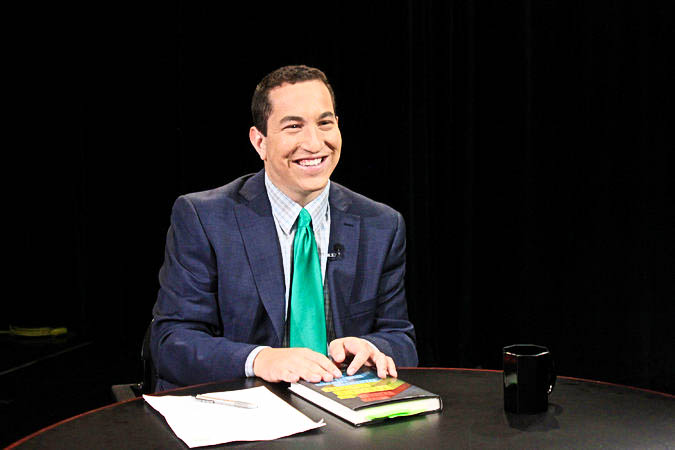
c/o nytimes.com
Journalist Alexander Heffner, host of the PBS show “The Open Mind,” spoke at the Allbritton Center on Wednesday, April 13. A talk show that welcomes guests of all political constituencies, “The Open Mind” has aired for almost 60 years, ever since Heffner’s grandfather, Richard Heffner, founded it in 1956.
“[‘The Open Mind’] is wonderful in the sense that it engages ideas seriously,” said Professor of Government and Environmental Studies Marc Eisner. “[It’s] a real effort to get to the heart of ideas in an open way.”
Heffner’s speech touched on a broad range of issues, covering political correctness, the media, civic values, and the role of the media.
“Your news consumption is not just a mechanism through which you become informed,” Heffner said. “It’s a mechanism through which you live a civic life that embodies values that you want to invest yourself in.”
Heffner encouraged those frustrated with the undue media coverage Trump receives or with the lack of media attention paid to Democratic presidential candidate Senator Bernie Sanders to act.
“You have more power than ever before to shift the conversation,” Heffner said, advising fed-up news consumers to contact network officials and newspaper editors about issues of insufficient coverage.
Characterizing the current political climate as mired by a strong decree of incivility, Heffner described how such incivility inhibits bipartisan discourse and the effective functioning of government. The three main contributors to this incivility, argues Heffner, are bigotry, obstructionism, and political correctness.
“The incivility of political correctness is a climate in which people feel fearful of speaking their minds, and it’s a climate which enables the bigotry, hate mongering, xenophobia, the profiteering of the media, and then ultimately, the obstruction,” Heffner said.
Director of the Allbritton Center and John E. Andrus Professor of Sociology Rob Rosenthal disagreed with this notion following the lecture.
“I think that incivility has to do with people being disenfranchised and not with political correctness,” Rosenthal said.
Before delving into the realm of political correctness, the talk turned toward the role the media plays in terms of fostering a level of obstructionism and bigotry. Motivated to a large extent by the desire to increase ratings, and therefore profits, many networks, Heffner explained, are encouraged to act in a partisan fashion, over-characterizing the views of one political party as wholly good or bad. Such divergent narratives make communication across the aisle increasingly unlikely, as it becomes hard to find any common ground without even having the facts in common. It’s difficult, Heffner continued, to find these facts with a discourse somewhat censured by political correctness.
The topic of political correctness resurfaced later in Heffner’s talk.
“There are ways to be constructive in your criticism, just as there are ways to be tolerably raw in your telling it as it is, and that’s civility,” Heffner said. “The left has lost that battle because of the way they think that it is an insult to marginalized groups to acknowledge truths about their history and about their livelihood.”
He and Rosenthal continued to speak about the Black Lives Matter movement, with Rosenthal highlighting how the movement aims to equalize black lives in society, not give them superiority.
“….When politicians responded by saying ‘all lives matter,’ it was, to those ears and I think understandably so, once more denying that the lives of black people were in a completely different situation than the lives of other people,” Rosenthal said.
Rosenthal then further spoke to the idea of political correctness and how his views diverge with those of Heffner in this case.
“I personally don’t think political correctness is why this [climate of political incivility] has happened, but I’m always interested in what Alexander has to say about these questions,” he said.
The dialogue continued despite the differing viewpoints.
“We just showed that you could have disagreements, and no one called anyone a name or anything,” Rosenthal said.
Heffner concluded with a call for an alternative to political correctness and a focus on greater dialogue, stressing the necessity of greeting opposite ideas with examination and discussion rather than immediate condemnation.
“We need a politics that’s courageous,” Heffner said.“We need a politics that’s not passive. We need a politics that’s controversial. Let’s hash [politically incorrect statements] out a little more and understand what the good phenomena are and what the bad ones are, because I’m making a thesis, and it’s a working thesis, that civility is good and political correctness is bad.”
Comments are closed